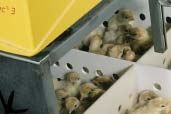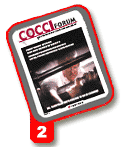COCCI News
Product updates and industry trends

Spray cabinet results in more uniform coverage
and protection. |
Coccivac-T, a live-oocyst vaccine
used for many years to
protect turkeys against coccidiosis,
has been approved
for convenient spray cabinet
administration in the United
States.
The spray cabinet results in
more uniform protection
against coccidiosis than other
administration methods, as
well as cost-savings for turkey
producers, says Dr. Lanny
Howell, technical services veterinarian
for Schering-Plough
Animal Health.
"The vaccine's sister product,
Coccivac-B, grew significantly
in the broiler market
after it was approved for spray
cabinet administration in
1997," he adds. "We expect to
see a comparable rate of
growth in the turkey industry
as more producers discover
the convenience and dependability
of this method."
The efficacy of spray cabinet
administration in turkeys
was clearly demonstrated in a
recent study by a private
research facility. All birds in
the study came from the same
breeder flock. There were 30
birds per pen and 10 pens per
treatment. One group was vaccinated
with Coccivac-T in the
hatchery at day 1 and the
other received the in-feed coccidiostat
monensin sodium
from day 1 to completion of
the trial at 14 weeks. The level
of monensin varied with each
feed change. Both groups
received virginiamycin at 20
gms/ton of feed throughout
the trial. All the birds were
weighed by pen at 7, 8, 10, 12
and 14 weeks of age.
According to Howell, the
group vaccinated with
Coccivac-T had significantly
higher average live weights
compared with the hens
receiving monensin. Feed conversion
adjusted for mortality
was not statistically
different between
the two treatment
groups.
Furthermore, the
total feed cost to
produce a pound
of bird was also
significantly lower
for hens receiving
Coccivac-T, he
says. The feed cost
savings was calculated
to be 0.7 cent
(US) per pound of body
weight, which equates to a
savings of over 11 cents per
hen (0.7 cent x 16 lbs).
Field trials involving nearly
20,000 doses of Coccivac-T
administered to day-old poults
demonstrate that the vaccine is
safe when administered by
spray cabinet. In the trial,
19,382 birds in two barns
received the vaccine via
coarse spray administration at
day one of age. The birds
were then monitored for 28
days.
"There were no untoward
effects caused by coarse spraying
the vaccine in the hatchery,"
he says. "In fact, when
compared with the history at
the farm, mortality was lower
and weight and weight uniformity
was above average in
Coccivac-T-vaccinated birds."
CocciForum Symposium Provides New Ideas
Schering-Plough Animal
Health continued its
successful series of
CocciForum symposia
with a three-day meeting
exclusively for
poultry veterinarians.
More than 40 consultants
came to the old
silver mining town of
Durango, Colo., to
learn more about new
strategies for coccidiosis
management. Speakers
included Dr. Harry
Danforth of the USDA;
Dr. David Chapman of
the University of
Arkansas; Dr. Greg
Mathis of Athens, Ga.;
Dr. Steve Roney of
Sanderson Farms,
Laurel, Miss.; and Dr.
Phil Hargis of Bates,
Ark. Schering-Plough
Animal Health's Drs.
Charlie Broussard and
Linnea Newman also
presented new information
from field trials.
In addition, Schering-
Plough Animal Health
used the conference to
brief veterinarians
about "Georgia 98," a
new infectious bronchitis
serotype that has
been reported in U.S.
broilers. Dr. Mark
Jackwood of the University
of Georgia presented
his latest work
with the new strain,
which demonstrated
that Georgia 98 is a
variant of 072, the
serotype found in
Shorbron®-D, which is
currently the vaccine of
choice.
A proceedings summarizing
the Durango
presentations is now
available. For a free
copy, contact your
Schering-Plough
Animal Health representative
or email
phyllis.middleton@
spcorp.com.
Source: CocciForum Issue No.2, Schering-Plough Animal Health.







